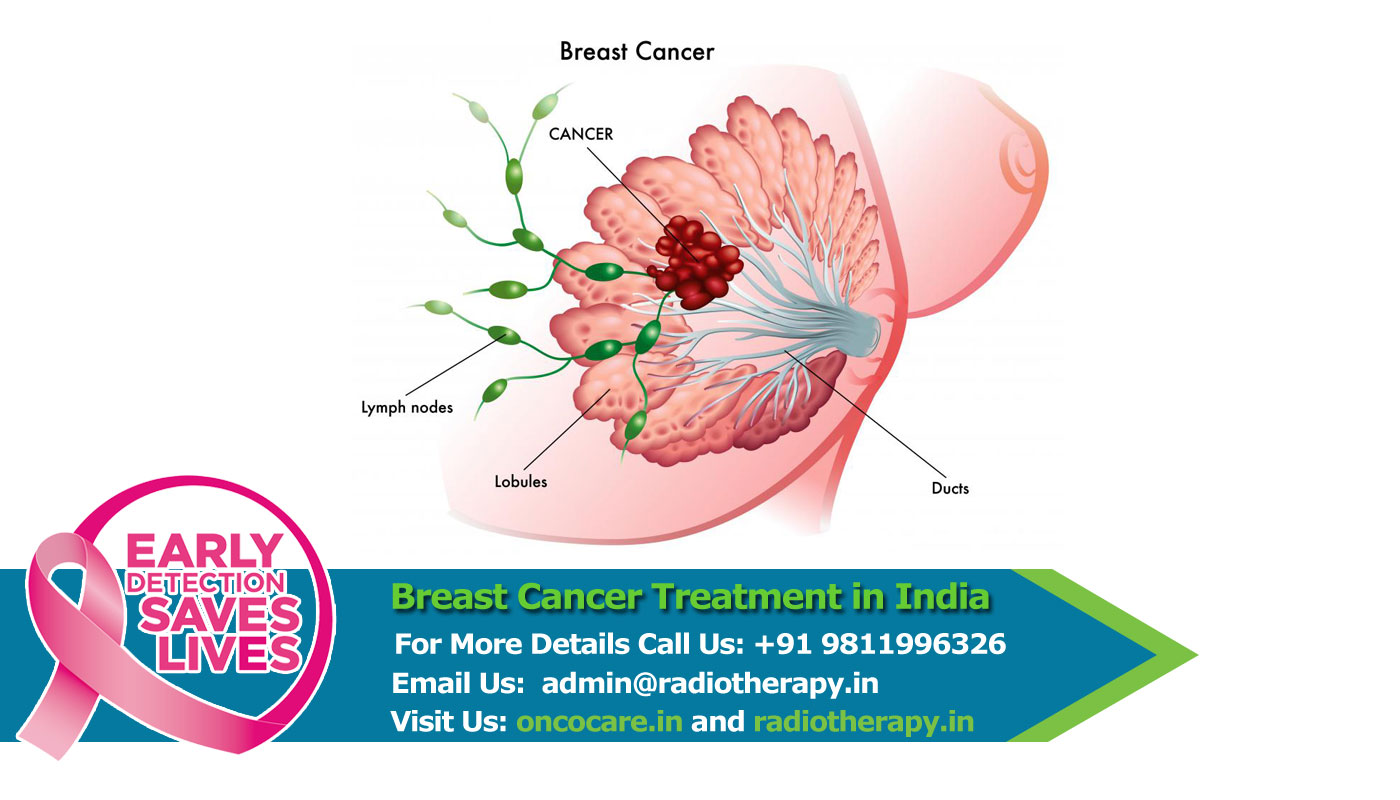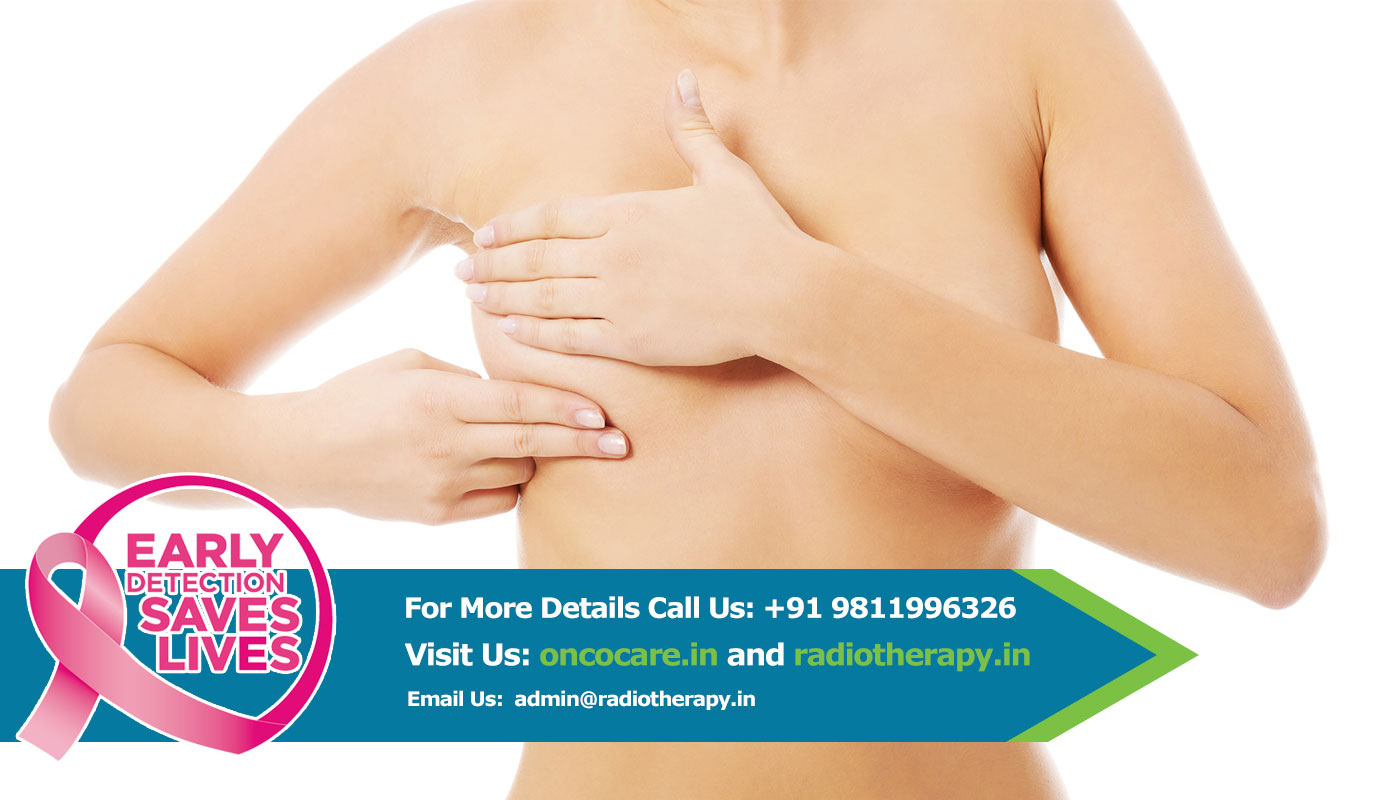Breast Cancer treatment in Delhi, Breast Cancer Treatment in India
Based on National Cancer Registry Programme (ICMR), report of (2001-03), about 25% of the total Breast Cancer Cases among Indian women constitutes of Breast Cancer Treatment in India. Breast Cancer usually starts off in the inner lining of milk ducts or the lobules that supply them with milk. A malignant tumor can spread to other parts of the body. A Breast Cancer that started off in the lobules is known as lobular carcinoma, while one that developed from the ducts is called ductal carcinoma.
Breast cancer starts in the cells of the breast. A cancerous (malignant) tumour is a group of cancer cells that can grow into and destroy nearby tissue. It can also spread (metastasize) to other parts of the body.
Cells in the breast sometimes change and no longer grow or behave normally. These changes may lead to non-cancerous (benign) breast conditions such as atypical hyperplasia and cysts. They can also lead to non-cancerous tumours such as intraductal papillomas.
But in some cases, changes to breast cells can cause breast cancer. Most often, breast cancer starts in cells that line the ducts, which are the tubes that carry milk from the glands to the nipple. This type of breast cancer is called ductal carcinoma. Cancer can also start in the cells of the lobules, which are the groups of glands that make milk. This type of cancer is called lobular carcinoma. Both ductal carcinoma and lobular carcinoma can be in situ, which means that the cancer is still where it started and has not grown into surrounding tissues. They can also be invasive, which means they have grown into surrounding tissues.
 book appointment
book appointment
Symptoms of Breast Cancer
Not everyone with breast cancer will have symptoms before they are diagnosed. But, according to the Centers for Disease Control and Prevention, possible symptoms of the disease include:
1. A lump in the breast or armpit.
2. A pain in the armpits or breast that does not seem to be related to the woman's menstrual period.
3. Dimpling of the breast or skin irritation
4. Red or flaky skin in the nipple area.
5. Nipple discharge other than breast milk
6. An area of thickened tissue in a breast.
7. One of the nipples has a discharge; sometimes it may contain blood
8. The nipple changes in appearance; it may become sunken or inverted
9. The size or the shape of the breast changes
10. The nipple-skin or breast-skin may have started to peel, scale or flake.
It's important to note that even these symptoms don’t necessarily mean a malignancy is present and often signal a benign condition, such as a cyst or infection.
 book appointment
book appointment
Risk Factors of Breast Cancer
1. Aging: On average, women over 60 are more likely to be diagnosed with breast cancer. Only about 10 – 15 percent of breast cancers occur in women younger than 45. However, this may vary for different races or ethnicities.
Gender: Although nearly 2,000 men will be diagnosed with breast cancer each year, breast cancer is 100 times more common in women. The National Cancer Institute estimates that over 190,000 women will be diagnosed with breast cancer annually.
2. GENETICS
Family history: Having a family history of breast cancer, particularly women with a mother, sister or daughter who has or had breast cancer, may double the risk.
Inherited factors: Some inherited genetic mutations may increase your breast cancer risks. Mutations in the BRCA1 and BRCA2 genes are the most common inherited causes. Other rare mutations may also make some women more susceptible to developing breast cancer. Gene testing reveals the presence of potential genetic problems, particularly in families that have a history of breast cancer. Read about Angelina Jolie's decision based on her BRCA1 test.

3. BODY
Obesity: After menopause, fat tissue may contribute to increases in estrogen levels, and high levels of estrogen may increase the risk of breast cancer. Weight gain during adulthood and excess body fat around the waist may also play a role.
Not having children: Women who have had no children, or who were pregnant later in life (over age 35) may have a greater chance of developing breast cancer. Breast-feeding may help to lower your breast cancer risks.
High breast density: Women with less fatty tissue and more glandular and fibrous tissue may be at higher risk for developing breast cancer than women with less dense breasts.
Certain breast changes: Certain benign (noncancerous) breast conditions may increase breast cancer risk.
Menstrual history: Women who start menstruation at an early age (before age 12) and/or menopause at an older age (after age 55) have a slightly higher risk of breast cancer. The increase in risk may be due to a longer lifetime exposure to the hormones estrogen and progesterone.
4. LIFESTYLE
A sedentary lifestyle: Physical activity in the form of regular exercise for four to seven hours a week may help to reduce breast cancer risk.
Heavy drinking: The use of alcohol is linked to an increased risk of developing breast cancer. The risk increases with the amount of alcohol consumed.
PREVIOUS TREATMENTS
5. Birth control pills: Using oral contraceptives within the past 10 years may slightly increase the risk of developing breast cancer. The risk decreases over time once the pills are stopped.
Combined post-menopausal hormone therapy (PHT): Using combined hormone therapy after menopause increases the risk of developing breast cancer. Combined HT also increases the likelihood that the cancer may be found at a more advanced stage.
Diethylstilbestrol exposure (DES): Previous use of DES, a drug commonly given to pregnant women from 1940 to 1971 to prevent miscarriage, may slightly increase the risk of developing breast cancer. Women whose mothers took DES during pregnancy may also have a slightly higher risk of breast cancer.
Radiation exposure: Women who, as children or young adults, had radiation therapy to the chest area as treatment for another cancer have a significantly increased risk for breast cancer.
Book Appointment


